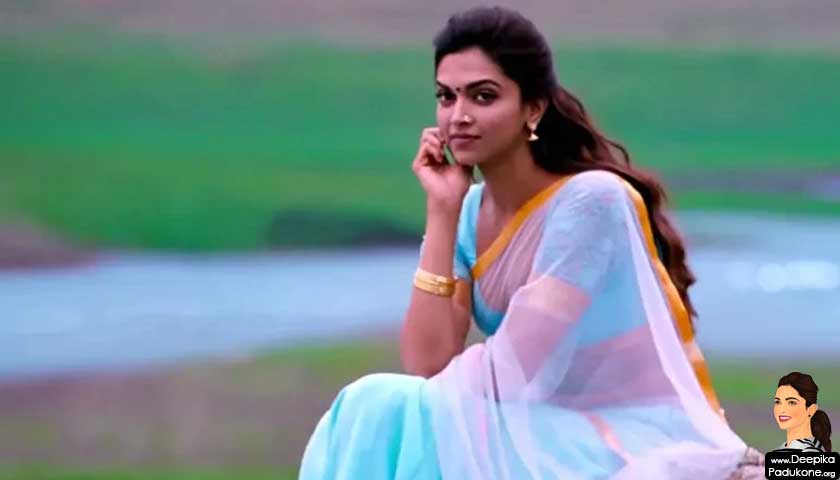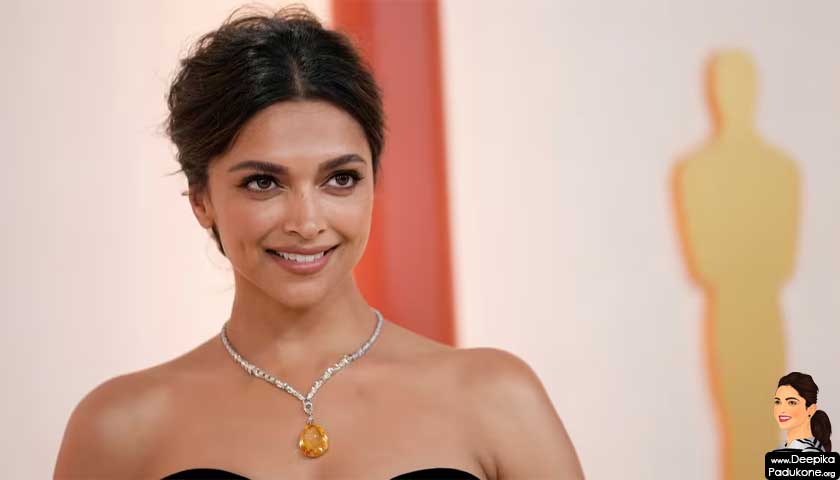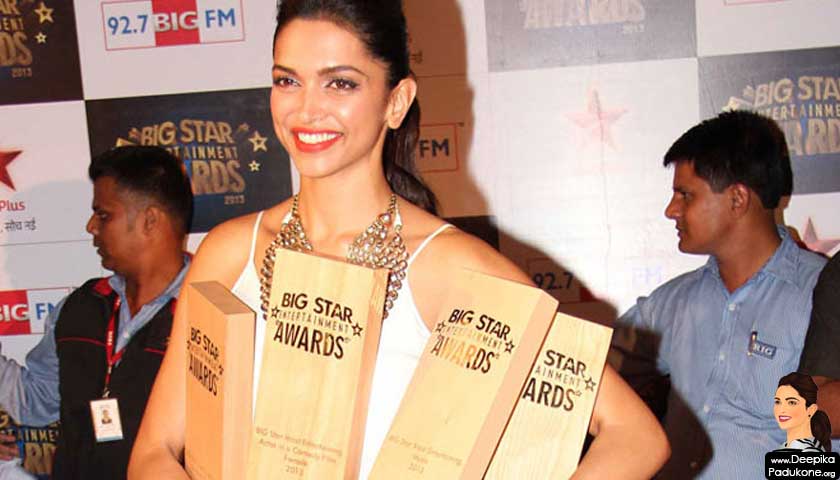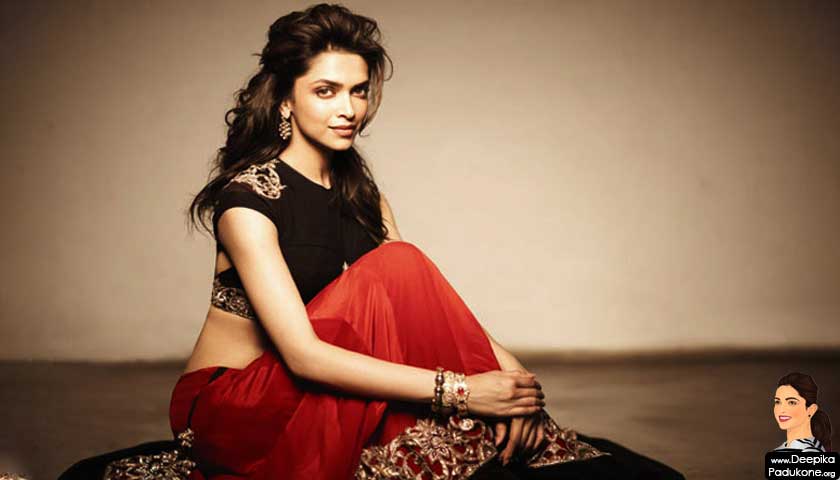Deepika Padukone establishing as a leading lady (2012–2015)
Padukone has said that her starring role in the 2012 Homi Adajania-directed romantic comedy Cocktail marked a significant turning point in her career. Raja Sen of Rediff.com opined that she had successfully proved to be a “stunning girl who can also act.” Set in London, Cocktail tells the story of a man’s relationship with two temperamentally different women—an impulsive party girl (Veronica, played by Padukone) and a submissive girl next door (Meera, played by Diana Penty). During the script narration, the producer Dinesh Vijan offered Padukone the choice of which woman to play; she decided on Veronica to expand her horizons as an actress. Portraying the role was a creative and physical challenge for her, and to achieve the physical requirements of her character she exercised extensively and followed a rigorous diet. Critics were divided in their opinion of the film, but particularly praised Padukone’s performance; Devesh Sharma of Filmfare credited her as the “soul of the film” and wrote that she “excels in every scene, whether as a material girl who enjoys sex, drugs and rock and roll or as the jealousy ridden girl out to destroy herself.” Cocktail earned Padukone Best Actress nominations at several award ceremonies, including Filmfare, Screen, and IIFA. The film also proved to be a box office success.
In 2013, Padukone had established herself as a leading actress of Hindi cinema by featuring in four of the top-grossing productions of the year. She collaborated with Saif Ali Khan for the fourth time in Abbas-Mustan’s Race 2, an ensemble action thriller that served as a sequel to Race (2008). The film received predominantly negative reviews, but grossed a successful worldwide ₹1.62 billion (US$23 million). Ayan Mukerji’s romantic comedy Yeh Jawaani Hai Deewani was Padukone’s next film release. Co-starring opposite Ranbir Kapoor, she was cast as Naina Talwar, a “shy wallflower,” which marked a departure from the glamorous characters that she had a reputation for portraying. Raja Sen thought that the film “lacked a good story” but added that Padukone “acts within herself and eschews exaggeration, and the results are impressive … This may be her most self-aware performance so far”. The pairing of Padukone with her former boyfriend was anticipated, and the film emerged as a major commercial success. Her next appearance was opposite Shah Rukh Khan in Rohit Shetty’s action-comedy film Chennai Express, as a Tamil girl on the run from her father (a local don), which required that she adopt a Tamil accent. Critical opinion on her accent was mixed, but her performance received praise; film critic Aseem Chhabra wrote, “Padukone is delightful in the film—beautiful, smiling, and often a lot more playful and funny than Khan.” Chennai Express earned over ₹3.95 billion (US$55 million) to emerge as one of the highest-grossing Indian films.
Padukone next played opposite Ranveer Singh in Goliyon Ki Raasleela Ram-Leela, an adaptation of the Shakespearean tragedy of Romeo and Juliet from director Sanjay Leela Bhansali. Her role was Leela, a Gujarati girl based on the character of Juliet. Initially titled Ram-Leela, the film’s title was changed after a court case was registered against Bhansali, Padukone, and Singh for “offending the religious sentiments” of the Hindu community by showcasing sex and violence under a title that referred to the life of Rama. Goliyon Ki Raasleela Ram-Leela released among protests across several states in India, but was generally well received by critics. Meena Iyer of The Times of India mentioned Padukone as “breathtaking”, and writing for Deccan Chronicle, Khalid Mohamed concluded that “it’s Deepika Padukone whom the film belongs to. Looking drop dead gorgeous and going at her part with a wallop, she’s the prime asset of Ram-Leela.” Her performances in Chennai Express and Goliyon Ki Raasleela Ram-Leela won her several awards, including the Screen Award for Best Actress for both films and the Filmfare Award for Best Actress for the latter.
In 2014, Padukone featured opposite Rajinikanth in the Tamil film Kochadaiiyaan, a period drama that was shot using motion capture technology. She was paid ₹30 million (US$420,000) for two days worth of work in it. In Homi Adajania’s praised satire Finding Fanny, Padukone played a young widow who takes a road trip with her dysfunctional friends (played by Arjun Kapoor, Naseeruddin Shah, Dimple Kapadia and Pankaj Kapur) in search of a woman named Fanny. The film was screened at the 19th Busan International Film Festival; critic Anuj Kumar of The Hindu wrote that Padukone successfully “takes off the fineries of Bollywood and you can sense the freedom from baggage in her performance”. Later that year, she starred opposite Shah Rukh Khan for the third time in Farah Khan’s renewal of Happy New Year. She played a bar dancer who trains a group of underachievers for a dance competition. Sanjukta Sharma of Mint found her role to be of minimal importance that required her only to be “a pretty thing to be laughed at and pitied”, but the film became one of her most successful, earning over ₹3.4 billion (US$48 million) worldwide.
Following an appearance in Homi Adajania’s online video on feminism, entitled My Choice, Padukone took on the role of a headstrong Bengali architect who cares for her hypochondriac father (played by Amitabh Bachchan), in Shoojit Sircar’s comedy-drama Piku (2015). She was drawn to the depiction of a realistic father-daughter bond, which she thought was rare in Hindi cinema. Reviews for the film were positive; Tanmaya Nanda of Business Standard praised the film’s feminist tone, and wrote that Padukone proves “what she is capable of when given something more to do than look pretty and be the crazy-dance girl at parties”. NDTV’s Saibal Chatterjee opined that she “holds Piku together with a restrained star turn”. With a worldwide gross of over ₹1.40 billion (US$20 million), Piku was a box office hit, and garnered Padukone several awards, including second Best Actress awards at Filmfare and Screen.
Later in 2015, Padukone played the part of a businessperson who helps Ranbir Kapoor’s character overcome his conflicts in Imtiaz Ali’s romantic drama Tamasha. Despite poor financial returns, Sukanya Verma of Rediff.com named Padukone’s performance as the best by an actress that year, writing that she “is so potent in Tamasha, it’s almost as if you can hear her heartbeat across the screen”. In her final release of 2015, Padukone reunited with Sanjay Leela Bhansali and Ranveer Singh in Bajirao Mastani, a historical drama about a tragic extramarital affair. Singh was cast as the maratha general Bajirao I, while Priyanka Chopra and Padukone featured as his first and second wife, respectively. To play the warrior-princess Mastani, Padukone learnt sword-fighting, horse-riding, and the martial art form of kalaripayattu. With a revenue of over ₹3.5 billion (US$49 million), Bajirao Mastani proved to be the fourth highest-grossing Bollywood film of the year. Anupama Chopra found Padukone “riveting”, but Subhash K. Jha thought that she was “way too subtle and silken, and not steely enough”. The film was showcased at the International Film Festival of India; at the 61st Filmfare Awards, Bajirao Mastani was named Best Film and Padukone received her second Best Actress nomination in that year.




